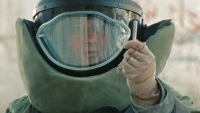It’s so tempting to vilify or belittle “wild men” like Staff Sergeant William James, to caricature them as egomaniacal adrenaline junkies. They get lumped in with cult leaders, they get dismissed as crazies. I believe many films play on our ability to relate to the other characters, those who balk at these rogues. Other filmmakers might have thanked James for advancing an interesting movie plot, but then dismissed him as a brash, self-destructive loner. Or they might have left us with the conclusion that he’s fueled by a deep personal pain stored up inside the “hurt locker” of his own ribcage. And then we would merely pity him. But I want to feel more about this character— and Kathryn Bigelow delivered with The Hurt Locker.
From the comfort and safety of our movie theater seats, we might identify with conservative types like Sergeant Sanborn who can’t imagine putting on James’ suit to work inside the “kill zone.” Or Specialist Eldridge whose leg was shattered as a direct result of James’ impulses. But the intrigue of Sergeant James is unshakeable. Changing channels, we revere sports heroes who risk life and limb for the absurd notion of higher, faster, further. We may cringe, but many of us ultimately relish the NASCAR wrecks, the skiing blowouts, and some of us brutes even root for hockey fights. We pay money to athletic trainers to bark at us like drill sergeants so we can go out and push our bodies to absurd new limits. We go to concerts or churches or read books that are self-confident outpourings of people who think differently, challenging us to achieve and transcend.
To me the magic of this film was that James was neither vilified nor revered— there was actionable character in him: something we could try out in our own lives. The Hurt Locker was, for me, a pure character study— of an archetype I don’t recall being portrayed in such a light. He wasn’t a bad man and he wasn’t perfect. He was an exceptional human who had flaws but also had a calling. And the strangest thing about him was that he knew that calling, he followed it, and he believed in it. That made him a wild man. His clarity seemed crazy to all the confused, scared, and unhappy people around him.
Perhaps “in the land of the blind, the one eyed man is king*,” but in our homeland of confusion, it seems we banish our sane to the outer fringe. Especially in a war movie, a character like James might recall the misplaced stubborn certainty that I would presume, in one way or another, starts every war. But there’s a logic to James’ headstrong, protocol-defying ways, as when he removes the “hurt locker” bomb suit for a particularly tricky defusing:
There’s enough bang in there to blow us all to Jesus. If I’m gonna die, I want to die comfortable. —James
Sure, something like that has been portrayed in film before (I’m thinking of Sergeant Riggs in Lethal Weapon), but in a time of career shifts all around me, financial crises, and rampant personal uncertainty, James’ clarity of purpose felt fresh. Here in this achingly intense, relentless portrayal of something horrific happening right now in war zones around the world, we’re expected to learn something from a character who can’t be a father or a husband or even much of a friend.
If we tone down the melodrama, and lower our expectations that heroes like James be avatars of virtue in every facet of his life, what rises to the surface is that James had a brilliant skill. Despite those who call pride a sin, despite admonitions that ego is bad, his impeccable intuition for an incredibly unsavory job is something that actually saved lives. I recall Marianne Williamson‘s words:
We ask ourselves, ‘Who am I to be brilliant, gorgeous, talented, fabulous?’ Actually, who are you not to be? … Your playing small does not serve the world. There is nothing enlightened about shrinking so that other people won’t feel insecure around you. We are all meant to shine, as children do … And as we let our own light shine, we unconsciously give other people permission to do the same.
 What if there was a little bit of right in every thoughtful, caring person the world ever knew? What if very, very few people (if any) were utterly worthless and the rest of us had something to contribute? Then it would be a matter of each of us, in our own way, figuring out what that contribution was, then honing it.
What if there was a little bit of right in every thoughtful, caring person the world ever knew? What if very, very few people (if any) were utterly worthless and the rest of us had something to contribute? Then it would be a matter of each of us, in our own way, figuring out what that contribution was, then honing it.
Life’s too short and there are too many other people out there to try to be a jack of all trades. Master something and become its wild man.
Thanks for reading. Cheers,
![]()
* This line appears in Tom Waits’ “Singapore”